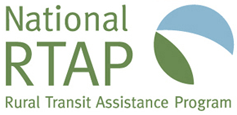About National RTAP
ABOUT
History of National RTAP
Millions of rural and tribal citizens are unable to drive for health, economic or lifestyle reasons. Transit is a real solution to maintaining a high quality of life in rural areas—providing access to jobs, healthcare, education, shopping and numerous other activities utilizing public transportation. The Urban Mass Transportation Administration (UMTA) provided several funding programs for transit in small urban and rural areas during the early 1970s. The 1974 National Mass Transportation Assistance Act created an annual formula grant program. Since 1979 UMTA—renamed Federal Transit Administration (FTA) in 1991—has provided formula funding to states under the Section 5311 Non-Urbanized Transit Program to establish and maintain transit systems in communities with populations under 50,000.
Soon after, program founders recognized that community transit drivers, dispatchers, maintenance workers, managers and board members needed special skills and knowledge to provide quality service to their diverse customers across large service areas. As a result, the Rural Transit Assistance Program (RTAP) was created in 1987.
Information about rural transit training and technical assistance prior to 1987 is available in A Look Back at Rural Transit Technical Assistance Before National RTAP.
The Formula Program for Rural Areas provides funding for the RTAP program. A portion of the funding is reserved for National RTAP; the remainder is distributed to the states by formula.
The goals of the RTAP program are to promote the safe and effective delivery of public transportation services in rural areas and to facilitate more efficient use of public transportation resources. To meet those goals, the program focuses on the following objectives:
- Improving the quality of training and technical assistance resources available to the rural transit industry
- Encouraging and assisting state, local, and peer networks to address training and technical assistance needs
- Promoting the coordination of transportation services
- Building a national database of information about the rural transit industry
Since its inception, National RTAP has contributed to the achievement of these objectives at the national level by developing and distributing training materials, providing technical assistance, creating web-based applications, producing reports, publishing best practices, conducting research, and offering peer assistance for rural and tribal transit providers and state RTAP programs.
National RTAP operates today under a cooperative agreement between the Federal Transit Administration (FTA) and the Neponset Valley Transportation Management Association.
National RTAP History Timeline

National RTAP offers one-stop shopping for rural and tribal transit technical assistance products and services. Call, email, or chat with us and if we can’t help with your request, we’ll connect you with someone who can!
" National RTAP offers one-stop shopping for rural and tribal transit technical assistance products and services. Call, email, or chat with us and if we can’t help with your request, we’ll connect you with someone who can! "
Robin Phillips, Executive Director
" You go above and beyond and I wanted to let you know that I appreciate it so much and always enjoy my time with you. The presentations give me so much to bring back to my agency and my subrecipients. "
Amy Rast, Public Transit Coordinator Vermont Agency of Transportation (VTrans)
" I always used the CASE (Copy And Steal Everything) method to develop training materials until I discovered RTAP. They give it to you for free. Use it! "
John Filippone, former National RTAP Review Board Chair
" National RTAP provides an essential service to rural and small transit agencies. The products are provided at no cost and help agencies maximize their resources and ensure that their employees are trained in all aspects of passenger service. "
Dan Harrigan, Former National RTAP Review Board Chair
" We were able to deploy online trip planning for Glasgow Transit in less than
90 days using GTFS Builder. Trip planning information displays in a riders'
native language, which supports gencies in travel training and meeting Title VI
mandates. "
Tyler Graham, Regional Transportation Planner Barren River Area Development District
Slide title
" Having a tool like GTFS Builder is really light years ahead of what it used to be at one time in terms of how fast you can put everything together. Our university students really can't imagine transit without it, so I think it's very important for us in terms of attracting that particular demographic. "
Michael Lachman, Transportation Services Manager HAPCAP - Athens Transit
Slide title
" In the past we used proprietary database software that was very challenging, very murky, and hard to update. GTFS Builder is a great opportunity to make this more user-friendly, more readily updatable and it
would enable us to show how to create a GTFS to more of the staff. "
Jaime McKay, Former Manager of Direct Services Center for Mobility Equity
Slide title
" Collaboration is a buzz word these days in the industry. On behalf of our Tribal segment, I appreciate RTAP for making Tribes a partner in industry opportunities. The organization goes over and beyond reaching partners one would not expect in a busy industry such as public transportation. Thank you for your tireless efforts! "
Franklin Akoneto, Comanche Nation
Slide title
"We are so very thankful for all your transportation training materials. Your resources are as valuable as gold!"
Holly Walton, Transportation Assistant Manager, Curative Connections
A program of the Federal Transit Administration administered by the Neponset Valley TMA
National RTAP is committed to making this website accessible to persons with disabilities. If you need assistance accessing any content on our website or need alternative formats for our materials, please contact us at info@nationalrtap.org or 781-404-5020.
by National RTAP |

